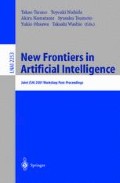Abstract
We imagine “driving a car” in a busy place. When we wish to enter into a main street from a side road or a parking area along the road, it must be much better for us that someone can give way for us although someone cannot gain any more by giving us whom someone might never meet. This kindness done by someone implies our gain. A symmetrical situation in replacing someone with us holds the same relation. Anybody who gives a kind arrangement to someone, can never be guaranteed to gain from another. If nobody never gave way for someone, the whole welfare on the roads should be extremely worsen. We call such a situation Avatamsaka Situation in the sense of the footnote.1 The gain structure will not essentially depend on the altruistic willingness to cooperate. The model after synchronizingour original setting albeit a vulgar conversion can be written down as a variant of coordination gamesalthough the model can then provide with infinite equilibria in view of individualistic expected utitility maximization. A profile of strategic deployments on a set of cooperation, defection may be argued in a repeated form. Thus one way to look for an eventual end point in our repeated game is to formulate the model in terms of evolutionary game of a simultaneous differential equations sytems.2 On the other hand, this paper will deal with a stochastic aspect of this evolutionary process. Finally, it is noted that we have internationally achieved Avatamsaka Game Experiment on the Web by my original program by the use of File Maker Pro’s web companigon.3
The Original Source: Avatamsaka is a well-known one of the Mahayana Buddhist Sutras. Shigeo Kamata, Professor Emeritus, the University of Tokyo, who is working under the field of Buddhists philosophy, skillfully illustrated the situation of Heaven and Hell in viewof Avatamsaka. See Kamata [18.5], pp.167-168. Suppose that two men vis a vis sat down at the table, across from each other. They however are tied with rope except for one arm only, then given each a too long spoon. Own selves cannot serve them by the use of a too long spoon. There are meals enough for them on the table. If they cooperate in concert to provide each other with meal, they can all be happy. This defines the Heaven orParadise. Otherwise, one will be so kind to provide the other with meal but the other might not have a feeling of cooperation. This case however pays the other. This must give rise a feeling of hate for the other. This describes a situation enough to note the Hell.
See Aruka [18.2], pp.10-22 and also “Avatamsaka Game Structure and Experiment on the Web” in Aruka(ed.) [18.3], pp.115-132.
We have already had experiments for several times in Chuo University, Japan, J.-W. Goethe(Frankfurt) University, Germany, and Maquette University, USA.
Access this chapter
Tax calculation will be finalised at checkout
Purchases are for personal use only
Preview
Unable to display preview. Download preview PDF.
References
Arthur, W. B.(1994): Increasing Returns and Path Dependence in the Economy, University of Michigan Press, Ann Arbor
Aruka, Y.(2000): Avatamsaka Game Structure and It’s Desgin of Experiment, IBRCYU(Chuo University) Working Paper 3
Aruka, Y.(ed.)(2001): Evolutionary Controversies in Economics: A New Transdisciplinary Approach, Springer, Tokyo
Cooper, R.W.(1999): Coordination Games, Cambridge U. P., Cambridge.
Kamata, S.(1988): Kegon no Shiso(The Thought of Avatamsaka), in Japanese, Kodan-sha, Tokyo
Polya, G., and F. Eggenberger(1923): Ueber die Statistik verketteter Vorgange, Z. Angew. Math. Mech. 3, 279–289
Polya, G.(1931): Sur quelques Points de la Theorie des Probabilites, Ann. Inst. H. Poincare, 1, 117–161
Author information
Authors and Affiliations
Editor information
Editors and Affiliations
Rights and permissions
Copyright information
© 2001 Springer-Verlag Berlin Heidelberg
About this paper
Cite this paper
Aruka, Y. (2001). Avatamsaka Game Experiment as a Nonlinear Polya Urn Process. In: Terano, T., Ohsawa, Y., Nishida, T., Namatame, A., Tsumoto, S., Washio, T. (eds) New Frontiers in Artificial Intelligence. JSAI 2001. Lecture Notes in Computer Science(), vol 2253. Springer, Berlin, Heidelberg. https://doi.org/10.1007/3-540-45548-5_18
Download citation
DOI: https://doi.org/10.1007/3-540-45548-5_18
Published:
Publisher Name: Springer, Berlin, Heidelberg
Print ISBN: 978-3-540-43070-4
Online ISBN: 978-3-540-45548-6
eBook Packages: Springer Book Archive

